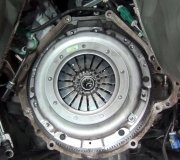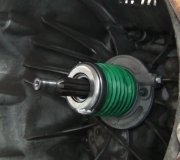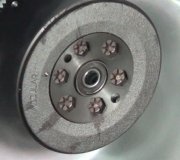I can't follow what you're trying to say. You need to use punctuation, and please avoid the abbreviations. What I DO understand is you think you can convert a manual transmission car to an automatic. Don't even fantasize about doing that. Doing that might have been possible many years ago with a lot of work and fabrication, but not today.
The floors are shaped differently depending on the type of transmission. Automatics today are computer-controlled and all the under-hood wiring is different. Automatic transmissions weigh more so the front springs will be stronger. With a different percentage of weight on the front, the front-to-rear brake balance is different. The brake system has been very carefully-calibrated at the factory to give balanced braking for the amount of weight transfer.
The Engine Computer will usually be different since you need one that is expecting to receive data from the transmission. You'll need a cooler for the transmission fluid. Those could be a separate unit but usually they're built into the radiator. That means you need a different radiator. Obviously you'll need a different shift lever and the indicator to tell you which gear you're in. That means the center console or steering column is different.
No professional mechanic is going to risk his reputation by taking your money because he knows this is not a practical solution.
Be aware too that lawyers and insurance investigators love to find modifications like lowered cars, raised trucks, non-original wheels, and anything similar to what you're hoping to do. They will convince a jury that you were partly at fault for the crash when the other guy ran the red light, because you were less able to avoid it, and they will be right. All of those things that change the height of the weight being carried, the weight transfer to the front during braking, how far the center of the tires are from the center of the car, tire diameter, etc, adversely affect stopping distance, steering response, handling, and comfort.
You need to look at this as an opportunity to trade what you have for what you want. If your car needs clutch work, this is an especially good time to trade it. All car dealers know that the majority of people trade off their old car because there's something wrong with it, and they have that already factored in to what they're going to give you for trade value. To say that a different way, suppose they offer you $10,000.00 for your car toward a newer one, and you told them it needs $2000.00 worth of clutch work. Instead, if you paid to have the clutch work done, then you trade the car, you're likely to maybe get $10,500.00 trade value. You won't get $12,000.00. In fact, you will never recoup all of your repair expenses through a higher trade-in allowance. Dollar-wise you're best off trading the car with all the disclosed problems and letting the dealer take care of them.
The amount you get for your old car depends too on the value of what you're buying. The more expensive the new car is, the more profit they usually have to work with as far as trade dollars. That can also vary between two identical cars at the same dealership, or two cars at two different dealerships, at least when it comes to new cars. Dealers don't actually own most of the new cars on their lots. They typically have to pay for them after 90 days. That's why they're especially motivated to sell those that have been on the lot longer. Also, there's always price increases taking effect. This is where you can find two identical cars at two different dealers, with two different prices. The car that was built one month earlier will have a lower shipping cost, lower base price, and lower cost of optional equipment.
There's usually more profit in used cars so dealers can give you more for your old one.
The drawback here is you're limited in choice to what they have on hand. If you want a specific option, model, or color, you have to do more legwork to find what you want. If you're not fussy about anything other than you need an automatic transmission, give the salesman a chance to suggest the best value for you. Part of the job of being a conscientious salesman is to determine what your needs and desires are, then try to meet them. Stay away from the salesman who doesn't care what you want or doesn't try to match your needs to the best choice on his lot.
Friday, May 29th, 2015 AT 7:44 PM


